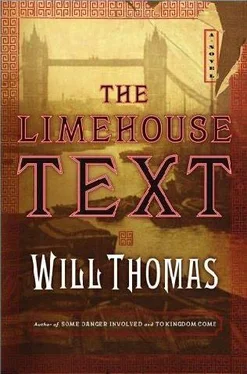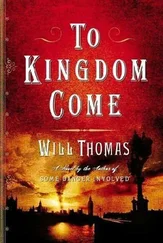Will Thomas - The Limehouse Text
Здесь есть возможность читать онлайн «Will Thomas - The Limehouse Text» весь текст электронной книги совершенно бесплатно (целиком полную версию без сокращений). В некоторых случаях можно слушать аудио, скачать через торрент в формате fb2 и присутствует краткое содержание. Жанр: Исторический детектив, на английском языке. Описание произведения, (предисловие) а так же отзывы посетителей доступны на портале библиотеки ЛибКат.
- Название:The Limehouse Text
- Автор:
- Жанр:
- Год:неизвестен
- ISBN:нет данных
- Рейтинг книги:5 / 5. Голосов: 1
-
Избранное:Добавить в избранное
- Отзывы:
-
Ваша оценка:
- 100
- 1
- 2
- 3
- 4
- 5
The Limehouse Text: краткое содержание, описание и аннотация
Предлагаем к чтению аннотацию, описание, краткое содержание или предисловие (зависит от того, что написал сам автор книги «The Limehouse Text»). Если вы не нашли необходимую информацию о книге — напишите в комментариях, мы постараемся отыскать её.
The Limehouse Text — читать онлайн бесплатно полную книгу (весь текст) целиком
Ниже представлен текст книги, разбитый по страницам. Система сохранения места последней прочитанной страницы, позволяет с удобством читать онлайн бесплатно книгу «The Limehouse Text», без необходимости каждый раз заново искать на чём Вы остановились. Поставьте закладку, и сможете в любой момент перейти на страницу, на которой закончили чтение.
Интервал:
Закладка:
We waited until all fifty were given a bowl, and one could feel the tension growing in the room. Ho stepped up to the table, raised his arm high, and then barked a word. The room erupted into chaos. The men leapt at the long table of food and began stabbing at the bowls with their chopsticks. I seized my own and joined the fray, spearing right and left. Chicken, prawns, and broccoli went into my steaming bowl. Plover’s eggs, bamboo shoots, the fried soy cakes I liked, and a ladleful of the yellow sauce followed. I avoided the bugs and snakes, of course. A water chestnut here, a bit of Chinese cabbage there, a slice or two of leek, half a clove of garlic. I was creating a masterpiece even Ho would envy. Beside me, Barker crowned his own creation with a large slice of shark’s fin.
Just when I was about to dig into my wonderful creation, a waiter leaned over and poured oil into my bowl. I looked up in disgust. What was he doing? He had ruined everything. All my work and now I would have to start over.
Barker spoke into my ear as the waiter did the same to his bowl.
“There is a village in China with a factory that has produced earthen bowls for centuries. It is in a small valley with mountains on either side and a river bisecting the town. The factory is on one side of the river and the village on the other. When women prepared lunch every day, it grew cold before they reached their husbands across the bridge. One day, a woman accidentally spilled oil in her husband’s bowl and discovered that not only did the oil seal in the heat so it could be carried, but the food continued to cook beneath it. That is how the soup got its name, Across the Bridge Soup. We must let it sit for five minutes, which is just enough time for toasts.”
Vessels of plum wine were served. An elderly Chinaman stood and spoke, and we downed our cups. Several toasts followed and I was beginning to get light-headed. Barker gave a toast for both of us and then Ho finished for us all, after which we attacked our bowls.
From childhood, the Chinese are trained to suck noodles. One could stretch a single noodle out ten yards and any Chinese man, woman, or child worth his weight in rice could suck it down in a matter of seconds. I am a rank amateur, but was still willing to give it a try. I launched into my bowl and did not surface for several moments. It was pure ambrosia. I was a genius. Who knew I had such unplumbed depths when it came to creating meals?
Barker had his bowl wedged up under his chin and was shoveling shark meat in like a trencherman while my neighbor on the other side gnawed his way through a glutinous sow’s ear. It was a race of sorts. We were a roomful of gluttons. I was glad that there were no women present to witness such a spectacle.
Ten minutes later there were fifty very full and groaning men with empty bowls. Some of us listlessly picked among the dregs at the bottom while the team of waiters brought tea.
“I have never eaten so much in my life,” I commented. “I thought I would taste the oil, but I didn’t.”
“Yes. The nameless woman who spilt oil in her husband’s meal deserves our thanks.”
The pipes came out after that, for those who smoked. Barker, of course, lit up his Turkish meerschaum while others went for the modern convenience of the Western cigarette. Still others favored thin metal pipes with patterns in cloisonne. Ho brought out his water-can contraption and was smoking it while talking with guests. He worked his way through the room, I noticed, and spoke to practically everyone. I hadn’t thought him so outgoing. As for me, I was in a funk. There was a slight ringing in my ears and I found I had been staring at one of the large letters on the wall for several minutes, trying to decipher it.
“I need some air,” I said to Barker.
“Good idea, lad. We should take a walk around the district. They should be getting up the decorations for tomorrow.”
Just then Ho came up between us. He bowed benevolently to some of the guests nearby. Then he leaned forward and spoke in English, just loud enough for us to hear. “K’ing is up to something. He recently purchased a warehouse in the area and has had carpenters working day and night. English carpenters, who won’t reveal his plans to anyone. No one knows what he is about, but something is happening.”
“Thank you for the information. I see K’ing never arrived. What of Woo?”
“I did not issue him an invitation. He has seen fit to criticize my cooking, that Peking popinjay.”
“We are going for a walk,” Barker said.
Ho raised a warning finger. “Be careful,” he admonished. “Remember what I said about digging your own grave.”
Limehouse had become enchanted that night. Every wall was festooned with messages in gilt and streamers of red paper and firecrackers. Entranceways that no one had bothered to sweep all year were now swept and mopped. The drab and mean streets of the area had become a fairyland, like Andersen’s tale of the nightingale, provided one did not look too hard at what lay beneath. I theorized that visitors came here for the celebration each year and never saw its harsher side. Perhaps that was how the district’s exotic reputation had begun.
Limehouse was astir, but the killer was not. Apparently, he had taken off the night and that was a good thing, as far as I was concerned. Barker and I were so full, we could not have given him much of a fight.
26
The next morning being the Sabbath, I crossed the street to the Baptist Tabernacle with Barker to hear Charles Haddon Spurgeon preach. The topic of his sermon was grace, which to me is always a cheerier subject than damnation. Along with the sermon came the hymns, which included “Amazing Grace,” Barker’s favorite, perhaps because it had been written by a sea captain.
After the service was over and we had shaken the pastor’s hand, we walked back to the house that we were no longer sharing and ate a solid English lunch of beef and mash and Yorkshire pudding, like a million other people in London. It must gall Etienne to cook such fare, without the chance to toss in a bit of garlic here, a bit of truffle there, but I would back his roast beef against any Englishman’s in the country.
Barker did not dawdle over tea but went upstairs to change his Sunday morning coat into a more serviceable cutaway. He came down a few moments later shooting his cuffs and adjusting his cufflinks.
“Are you ready, lad?” Barker called up the staircase to me. One always tries to dress appropriately, but what does one wear to a Chinese New Year celebration? Given the circumstances, I decided to err on the side of caution and wear my overcoat with the lead-lined padding and built-in holster. After all, we were looking for a killer, not merely taking in the sights.
My employer stuffed a finger and thumb under his mustache and emitted a shrill whistle that brought a hansom cab to our curb. We climbed aboard and were soon on our way.
“Are you armed?” he asked.
“One pistol. I couldn’t use the other one, so I did not bring it. Do you think tonight shall be important?”
“Yes, I do,” he responded. “New Year’s is a time to finish old business and begin the new. Alliances are made or broken. Everyone hopes for health and prosperity during the coming year, but I’ve known more than one life to be snuffed out on such a night and more than one business financially ruined.”
After we crossed London Bridge and were in Commercial Street, he went on. “I imagine much of the East End shall be there tonight to enjoy the spectacle. There shall be the usual food merchants and trinkets for sale. There shall also be pickpockets, confidence tricksters, drunken sailors, and brawls. Several West Enders will be slumming, looking for their first taste of opium. Street musicians will abound, as will beggars. Limehouse shall be rouged like an old tart, looking to divert the public, while the merchants of the quarter cosh them and take their money.”
Читать дальшеИнтервал:
Закладка:
Похожие книги на «The Limehouse Text»
Представляем Вашему вниманию похожие книги на «The Limehouse Text» списком для выбора. Мы отобрали схожую по названию и смыслу литературу в надежде предоставить читателям больше вариантов отыскать новые, интересные, ещё непрочитанные произведения.
Обсуждение, отзывы о книге «The Limehouse Text» и просто собственные мнения читателей. Оставьте ваши комментарии, напишите, что Вы думаете о произведении, его смысле или главных героях. Укажите что конкретно понравилось, а что нет, и почему Вы так считаете.












